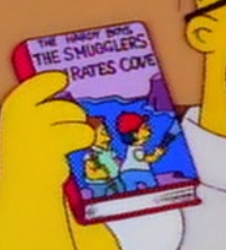
'The Smugglers of Pirate Cove'
Wikisimpsons - The Simpsons Wiki
Revision as of 08:30, October 8, 2011 by Mythigator (talk | contribs)
The Smugglers of Pirate Cove
| ||||
Book Information
|
The Smugglers of Pirate Cove is a book in the Hardy Boys series.
History
Homer went to the library at Springfield Elementary School to read up on Thomas Edison, and also read some of the Hardy Boys books. When Bart found Homer in the library, Homer said that the Hardy Boys books were great, then pointed at one and said it was about smugglers. Bart dimissively said they were all about smugglers, but Homer contradicted him: "No, not this one! The Smugglers of Pirate Cove. It's about pirates."
Behind the Laughter
- The Hardy Boys is a real book series about teenage detectives Frank and Joe Hardy; however, there is no actual book titled The Sugglers of Pirate Cove. The series first appeared in the 1920s and books about the boys are still being published in the 2010s, even though the series has been through several revisions and reincarnations over the decades.
- Many of the books' covers show the boys looking at something, as seen in the book that Homer holds up.
- Bart's dismissive comment references the fact that the boys' discovering and breaking up smuggling rings is an often-recurring plot motif, particularly in the original 1920s series and its revisions, which appeared in the late 50s through mid-70s.

